feature image via Shutterstock
It’s 2014, and queers are coming out in droves, increasing visibility and demanding basic human rights. But in many ways, bisexuals have a harder time coming out. We’re substantially less represented in fictional media and in public life, and plenty of people still believe bisexuals are selfish, greedy, duplicitous, indecisive, emotionally unavailable unicorns going through a phase. Bisexual adults and youth are much less likely than their gay and lesbian counterparts to be out to their friends and families, according to recent reports from LGBT Movement Advancement Project and the Human Rights Commission.
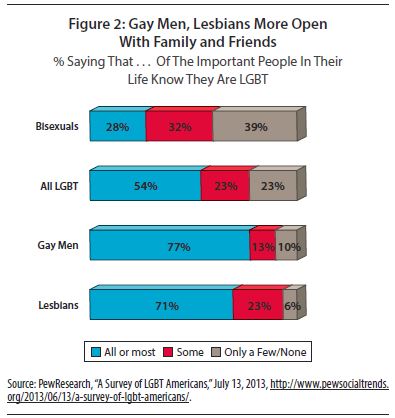
Some bi people put off coming out or come out as gay or lesbian because they feel forced to be decisive and hear from all corners that bisexuality isn’t a legitimate choice. There’s no one way to come out as bi — some people have an easy time and lots of acceptance, others have to fight harder to gain respect for their decision. Some figure it out young, and others come out as bi after identifying as straight or lesbian for a long time. To celebrate Bisexual Awareness Week, we turned to our readers for their anecdotes and advice about coming out as bisexual. Add your own ideas, stories and questions in the comments!
“The quickest/least arduous way to come out to all those acquaintances and other people who don’t really deserve a personal disclosure IMO is to start posting super gay pics of yourself on facebook.” – Jeannette, 29
My coming out experience has been pretty great, honestly. I didn’t really let myself explore dating women until a few years ago, and so I’m going through all these milestones as a mostly independent adult, which has had its advantages. Like a lot of bisexuals or femmes I know, coming out is an ongoing, piecemeal process. The first person I came out to was a dear friend and mentor who identifies similarly. She was wonderfully supportive and in hindsight I’m glad that I told her first. Everyone should be so happy for you when you come out to them!
My friends have been mostly awesome, and I was pleasantly surprised at how quickly they adjusted to being more gender inclusive when talking about dating and sex partners. I was absolutely terrified to tell my conservative, Christian family. I was afraid that they would stop talking to me or keep me from spending time with my little siblings, nieces and nephew. Thankfully, that actually went pretty well too. My mom and older sister were definitely surprised when I first told them I was bisexual, but they didn’t yell or question what I was saying. My mom was more concerned that I hadn’t felt like I could tell her sooner. (We didn’t, and still haven’t, discussed her homophobia/biphobia in relation to my waiting so long to come out.) More of their discomfort surfaced when they later met the woman I’m dating, but that’s another story! The quickest/least arduous way to come out to all those acquaintances and other people who don’t really deserve a personal disclosure IMO is to start posting super gay pics of yourself on facebook. They’ll figure it out.
I still choose to come out to people all the time in all kinds of situations; it is exhausting and scary, but overall my experiences have been positive. My age, the fact that I’m white, living in a relatively liberal town in CA and my “gender-normative” appearance have all made this fairly easy for me. I know that I am so privileged to even have a choice to come out; for me it has been an immense relief and hugely affirming. I believe coming out is a personal decision, and I think that all lgbtqia people coming out deserve to be met with warmth and joy.
“I’ve yet to meet a man who is immediately comfortable with my sexuality.” – Hannah Hodson, 23, Autostraddle writer
I never really came out as bisexual until after college. In middle school a bunch of girls were being accused of saying they were bisexual to get the attention of boys, so I kept my relationship with a girl under wraps. I couldn’t stand to be bullied more than I already was. In high school I tried to embrace it, but all of the girls I ever wanted to date ended up with the boys I wanted to date. I wasn’t ashamed of it or anything, but my fear of rejection prevented me from ever approaching women outside of the context of hooking up at parties. By the time I got to college, I was so used to downplaying my sexuality that I didn’t feel “queer enough” to be a member of the queer community. As a cis femme bisexual I had the was often perceived as straight and didn’t think I related to the same kinds of adversity the queers in college seemed to face. I had never been a member of any kind of queer community and was terrified of saying the wrong thing to the wrong person, which did happen a few times actually. So I told people that I identified more with being a Black woman than with my sexuality, which was a lie.
Coming out to men was an experience of its own. For male friends, there was an immediate dismissal involving something along the lines of “yeah, but you’re not really gay though.” I will never understand why, because it had nothing to do with them. For male partners there was one of two reactions. The first, most common reaction was to tell me they thought it was really hot, and immediately ask me if I would consider having a threesome. One time the guy even asked me to have a threesome with the girl he was cheating on me with! I mean, obviously that guy was an asshole, so maybe that was to be expected. It’s not that I’m not open to the idea of being with multiple people, but the immediate assumption that being bisexual means that I’m into something kinkier was definitely offensive. On the flipside, and this was with the men who actually respected me, they took my bisexuality very seriously and saw it as a threat to their masculinity. It’s kind of funny actually, because after a while I would suggest that we try something kinkier, and they would jump to the conclusion that I was dissatisfied with the relationship and wanted to run away with a woman or something very drastic. I’ve yet to meet a man who is immediately comfortable with my sexuality. The latter sort of dude, though, is easier to work on.
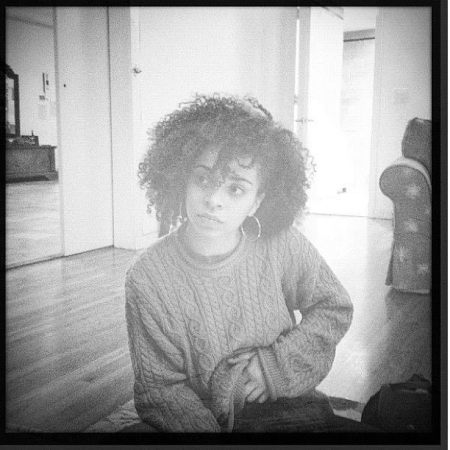
It wasn’t until a few years ago that I began dropping hints to my parents that I was bisexual. I don’t think I ever told them because I knew it wouldn’t be a big deal to them, and I didn’t want to act like it was some kind of… well, big deal. They know now. My dad couldn’t care less. Growing up my dad told me “I always thought it be really hip to have a gay kid,” dropping the hint that either he knew, or that he would embrace it. My mother actually took it harder than I thought she would. I think she mostly felt as though this was something she should have known about me and was sad I didn’t tell her sooner. I guess I’m still sort of coming out. I’m learning to embrace my sexuality as a primary part of my identity rather than an afterthought. It feels really good.
“You know how you can be attracted to a blond girl or a brunette girl, but hair color wouldn’t be a deal breaker or majorly affect your level of interest in someone? That’s how I feel about gender.” – Kadry, 28
When you say the word “bisexual,” a bunch of stereotypes come to mind for most people. So I avoided the word entirely; instead, I told people that I was attracted to humans regardless of gender. I didn’t bring out the B word until I had already given people some time to get used to what it meant.
Here’s how I explained bisexuality to my monosexual friends who just didn’t get it: You know how you can be attracted to a blond girl or a brunette girl, but hair color wouldn’t be a deal breaker or majorly affect your level of interest in someone? That’s how I feel about gender. An individual’s personality, not their gender expression or sex, is what attracts me. And if you married a redhead, you could still appreciate the attractiveness of other hair colors without feeling a burning need to satisfy your desire for brunettes. Hair color and gender are all just categories that have as much significance as you give them.
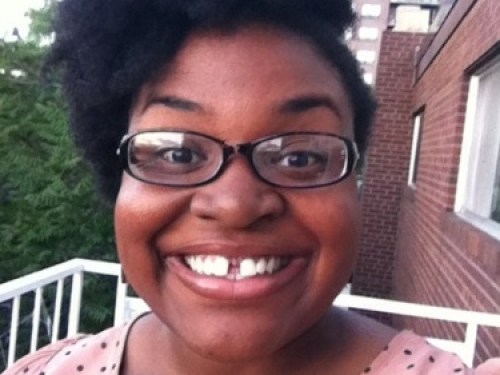
“It feels like the opposite of a coming out story; I was out and proud as a lesbian, and now I don’t know what I am.” – Rachel, 24
This article is my coming out as non-lesbian. I’ve identified a lesbian since I was in high school. Throughout high school, college, and grad school, I have been exclusively interested in women. This summer, to my surprise, my found myself attracted to a cisgender, straight guy. I’ve known him for a while, and I had never thought of him in a romantic light… until one day, as if someone snapped their fingers and put a spell on me, I woke up and was romantically attracted to him. Nothing ended up happening with this guy, but the crush changed me. It feels like the opposite of a coming out story; I was out and proud as a lesbian, and now I don’t know what I am. I don’t exactly identify as bisexual, and I still feel very attached to the lesbian & gay labels, so I’m trying to figure it out.
To help myself figure out what’s going on, I wrote a one-act play based on my experience. I’ve used the play as a coming out device. I had a reading of the play recently, and the people involved were very appreciative of the subject matter, as it’s something some of them have experienced. Before I started writing the play, I told several friends about my crush, and I received a wide variety of responses — everything from “sexuality is fluid” to “whaaaattttt???!!!!” I don’t even know if the guy knows about my crush on him, but he unknowingly changed me.
One of my favorite quotes is, “The real voyage of discovery consists not in seeking new landscapes but in having new eyes.” -Mary Engelbreit. I definitely have new eyes.
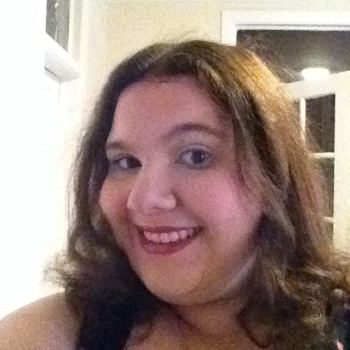
“The assumption was I’d want to get settled and married, buy a house and start having kids soon, so I shouldn’t do anything that would soil that path.” — Anonymous, 35
When I came out to my mom, she told me not to let anyone know I’m bisexual. She was afraid I’d lose my job. She was afraid men I’d date wouldn’t want to settle down with me. The idea that I might want to date women wasn’t something she understood. Gay people have such a tough time in life, so obviously if you could be attracted to the opposite sex, you’d go that route, no brainer. Why be happy when you could be normal? The assumption was I’d want to get settled and married, buy a house and start having kids soon, so I shouldn’t do anything that would soil that path.
I do volunteer work with kids, and my mom said that if the parents of those kids found out I was bi or gay, they’d start looking for signs I was molesting their kids, and then I’d be sued by one of them. She also brought up the sexual abuse I’d suffered as a nine-year old. We hadn’t talked about it since I was that age, so it felt like it was from left field. It seemed like the implication was that experience had made me queer, and therefore my identity was unnatural or perverted.
It was the king of all uncomfortable conversations. That was 10 years ago, and we haven’t spoken of it since. I haven’t had a relationship with a woman that’s progressed to meeting my parents. Some day I hope to. I think it will go OK because she’ll be an actual person for them to talk to and relate to, and not an abstract concept of sexuality.
“It wasn’t until I realized I was falling in love that I came clean.” – Anica, 31
I came out almost two years ago… again. After happily living as a lesbian for years, I was dumbstruck when an evening with a male co-worker ended in an enjoyable kiss.
For me, our relationship was quite similar to many first, unexpected homosexual relationships. I only told a couple of very close friends the truth and played the pronoun game with everyone else. It wasn’t until I realized I was falling in love that I came clean.
I think it’s easier coming out as bi after you’ve been out as a lesbian, because usually the big risk is whether the person accepts non-heterosexuality. In my experience, the straight people couldn’t care less; some found the announcement hilarious, but most thought it unnecessary, as they didn’t understand its significance to my life or identity. My lesbian friends, on the other hand, well, they accepted it eventually. There was the obligatory watching of Chasing Amy and listening to “I Spent My Last $10 on Birth Control and Beer.” There were the looks of disgust, which were always fun, but they subsided.
The real issue for me being bisexual is the bisexual bias and how many women don’t want to date a bi girl. The coming out part was easy in comparison.
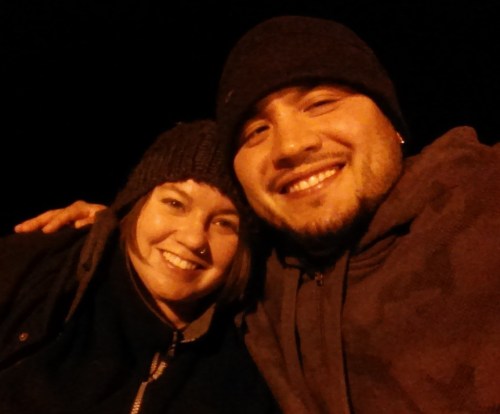
“There can be scrutiny from lesbians or gay men, as bisexuals may be considered indecisive or imposters, which doesn’t always make it easy to be yourself.” – Hellcat, 25
My history of intimate partners includes partners of a range of genders, as well as both cis and trans partners, which play a role in how I present myself in society. If I have a boyfriend I’m perceived as “straight;” if I have a girlfriend I’m considered a lesbian. Regardless, I typically “come out” as bi to indicate that part of my identity so I’m true to myself and for others to realize we exist. I “come out” by mentioning an ex-girlfriend/boyfriend in casual conversation with a potential partner of the opposite sex, or I blatantly say I’m bi. Within our community there can be scrutiny from lesbians or gay men, as bisexuals may be considered indecisive or imposters, which doesn’t always make it easy to be yourself. Unfortunately, living in Texas means my sexual orientation poses a threat. Ultimately, the choice to come out is yours and your safety and wellbeing should be a priority. If something isn’t working for you (job, relationship, etc.) you should get out of it and move on with your life. Surround yourself with people who accept you, and remember that your sexual orientation is only a piece of your full identity.





